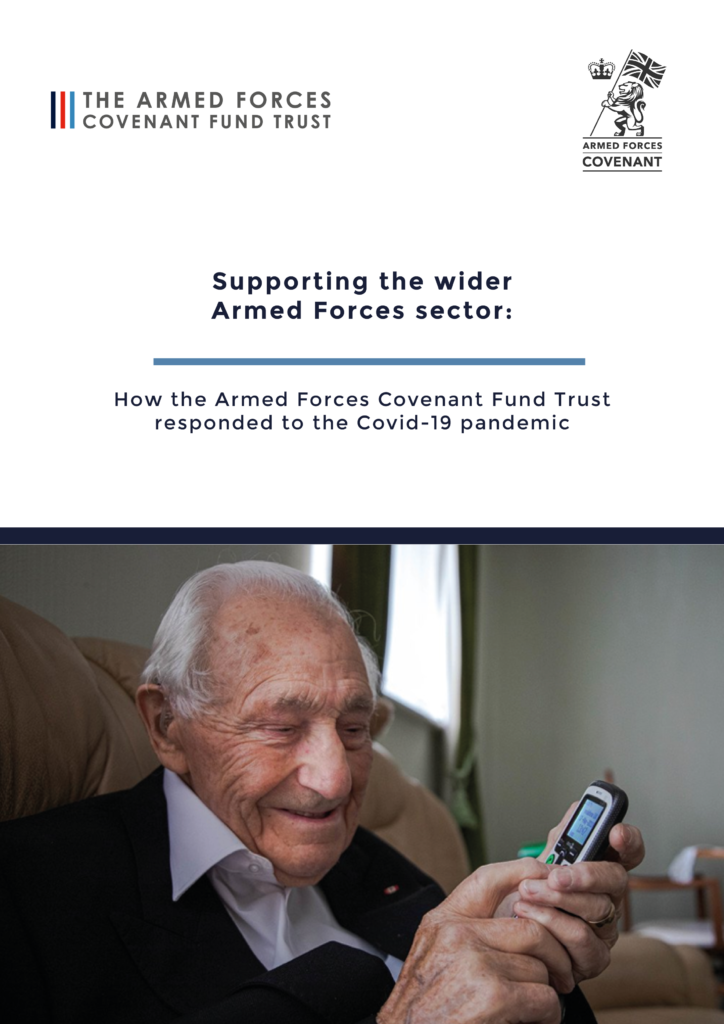Evaluating the impact of Trust funded programmes
The Trust conducts and commissions evaluations on a number of our funding programmes to discover more about the impact they have had. We place great importance on such evaluations as they help us discover best practice and consider what more can be done, including any next steps for the future.
Discover more about the latest programme evaluations below.
Veterans’ Places, Pathways and People Programme – interim evaluation report
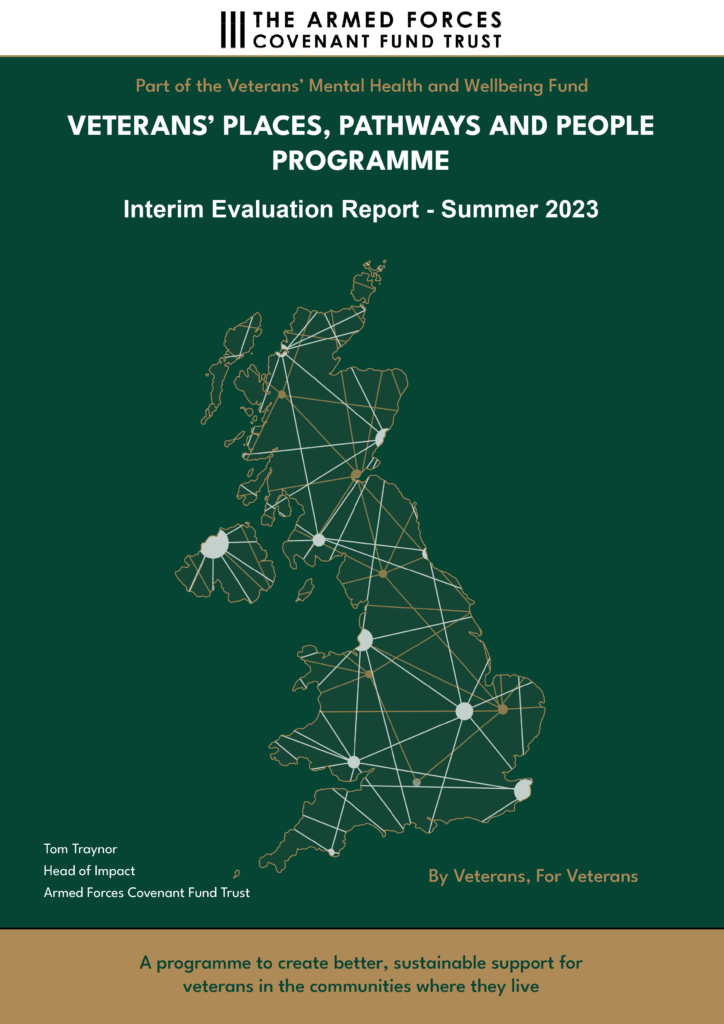
This report is an evaluation of the first year of the Veterans’ Places, Pathways and People programme, part of the Veterans’ Mental Health and Wellbeing Fund.
The report reveals the challenges the programme aimed to address, and the many achievements made so far to improve support for veterans in the communities where they live.
Sustaining Delivery of the Covenant Programme
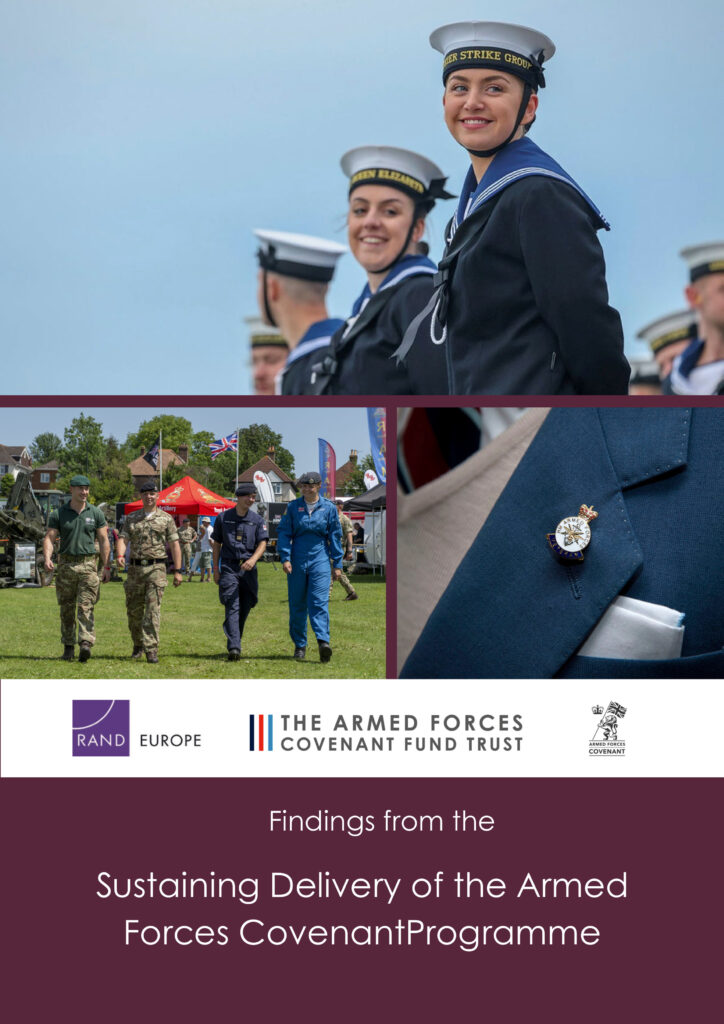
This report is the final report of a study RAND Europe conducted on behalf of the Trust. It forms part of an ongoing evaluation of programmes we delivered to support local authorities to better implement the Covenant at a local level.
Strengthening and Empowering Delivery of the Covenant: Evaluation of the Strengthening Delivery of the Armed Forces Covenant Programme
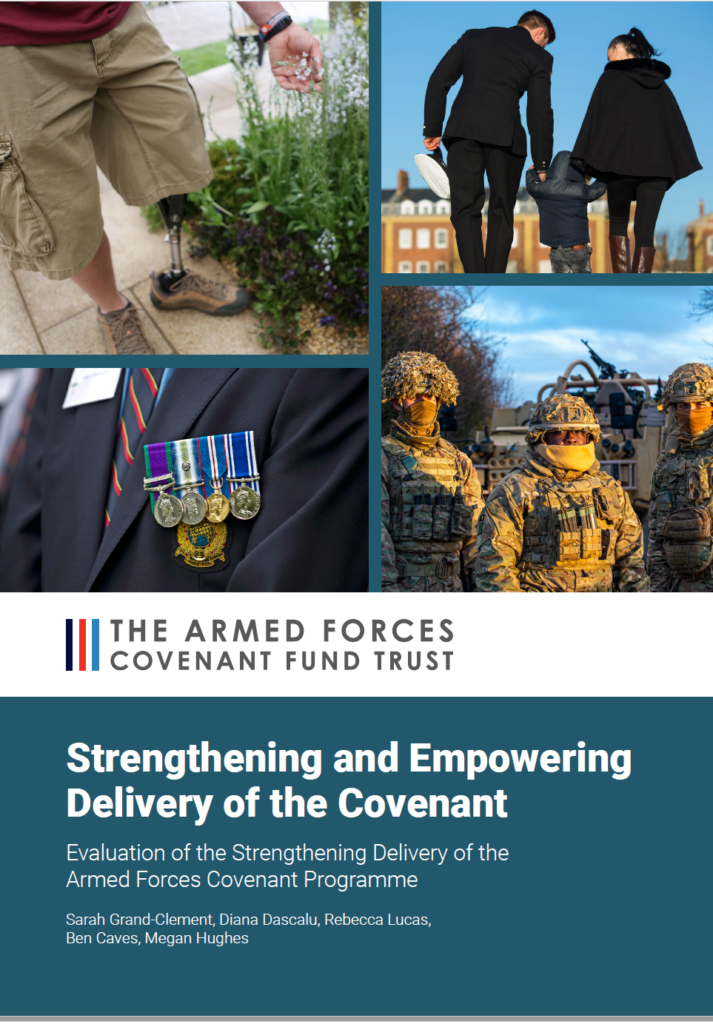
Under the Strengthening Delivery of the Armed Forces Covenant Programme The Covenant Fund awarded £6.6M through two rounds of funding to clusters of Local Authorities.
The projects were evaluated by RAND Europe. The report found that the funding had a significant positive impact on delivery of the Covenant
Evaluation Report for the Tackling Serious Stress in Veterans, Carers and Their Families Programme
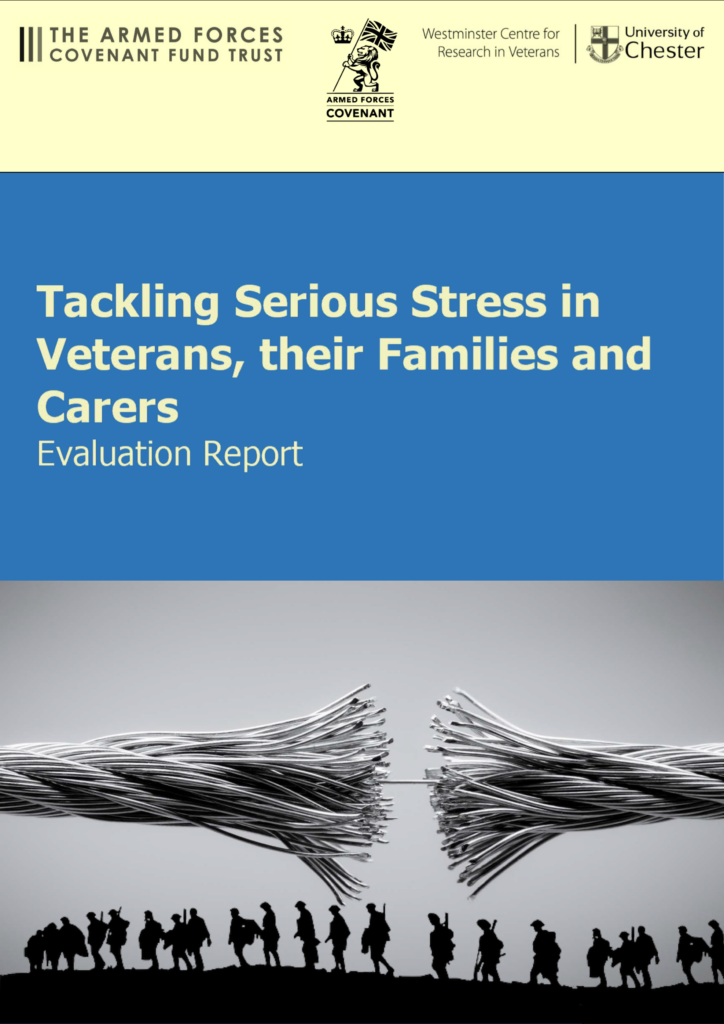
This report explores the impact of the £4.2M Tackling Serious Stress programme which was designed to provide funding for innovative and new ways of working to reduce serious stress in veterans, their carers and families.
Evaluation report for Tackling Loneliness
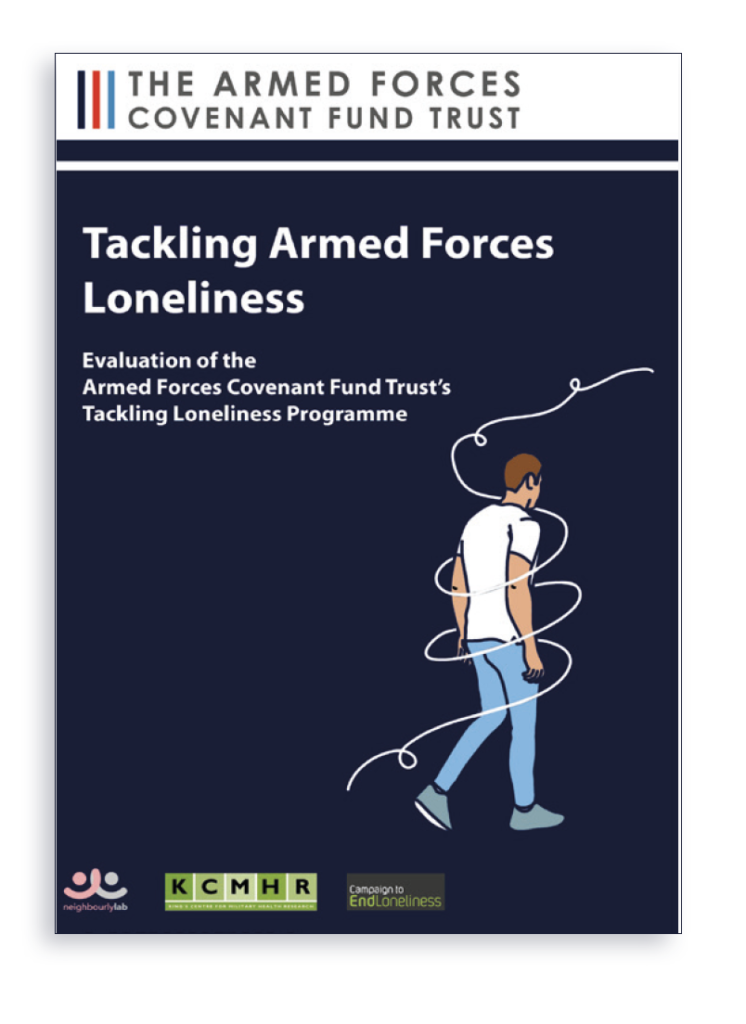
The Trust commissioned Neighbourly Lab, the Campaign to End Loneliness and the King’s Centre for Military Health Research to conduct a year long evaluation of the 60 projects on the Tackling Loneliness programme.
This in-depth evaluation looks at the success of our Tackling Loneliness programme, including identification of best practices. It also explores loneliness and its effect of the Armed Forces community.
Enabling immediate support for vulnerable veterans with reduced social contact
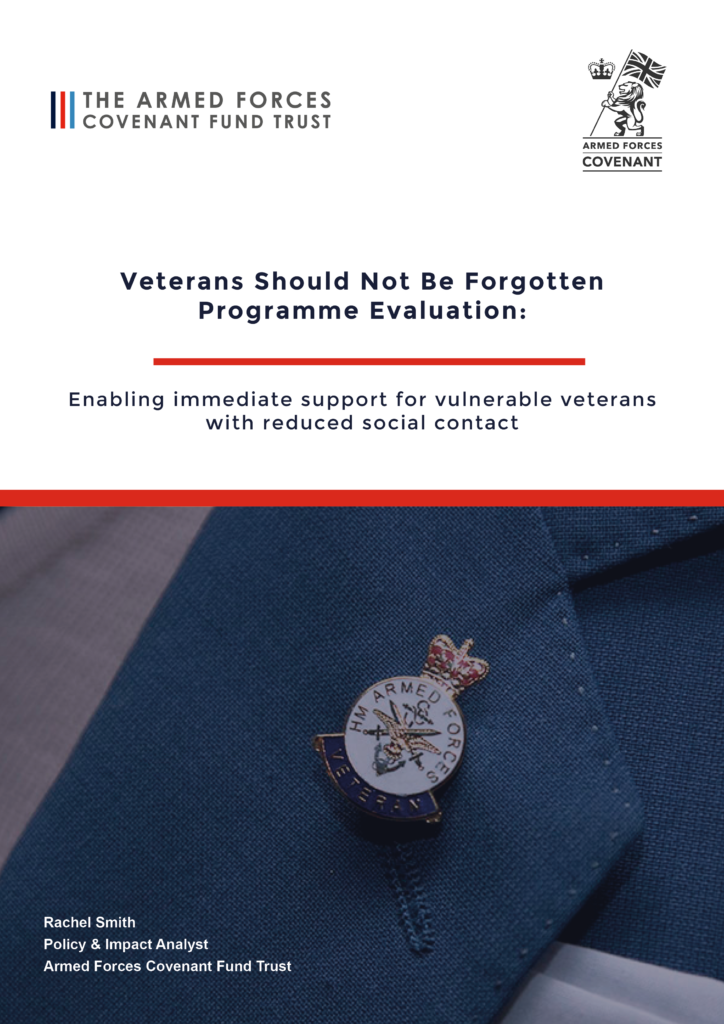
This programme evaluation explores the impact of the 120 grants made to organisations across the UK under the Veterans Should Not Be Forgotten programme, totalling £2,394,698.
How the Armed Forces Covenant Fund Trust responded to the Covid-19 pandemic.
LIBOR Funding and its Impact

This report explores the projects and organisations funded through the HM Treasury LIBOR Fund (HMT LIBOR Fund), the £35 million LIBOR Fund and the Veterans Accommodation Fund.
Collectively, these funds distributed £578.2 million in 472 grants to 334 organisations between 2012 and 2017.
Family Life and the Armed Forces Community Evaluation
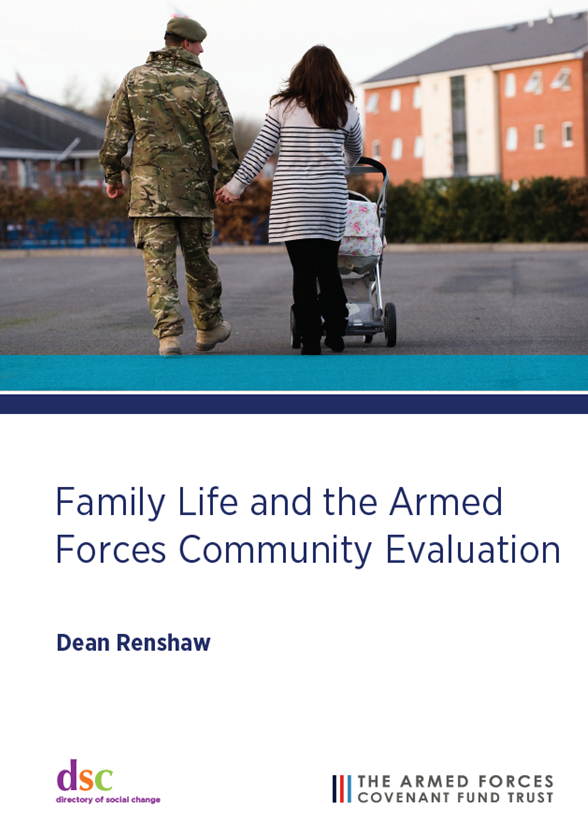
This evaluation explores the impact of both the Families in Stress and Removing Barriers to Family Life programmes, which awarded just under £4.34 million and just under £7.12 million respectively between 2016 and 2020.
The impact of the projects awarded under the two programmes has been analysed by the Directory of Social Change (DSC) and the Trust is delighted to share the stories of the grant holders and their work in supporting Forces families across the UK.
Armed Forces Covenant: Local Grants Programme Evaluation
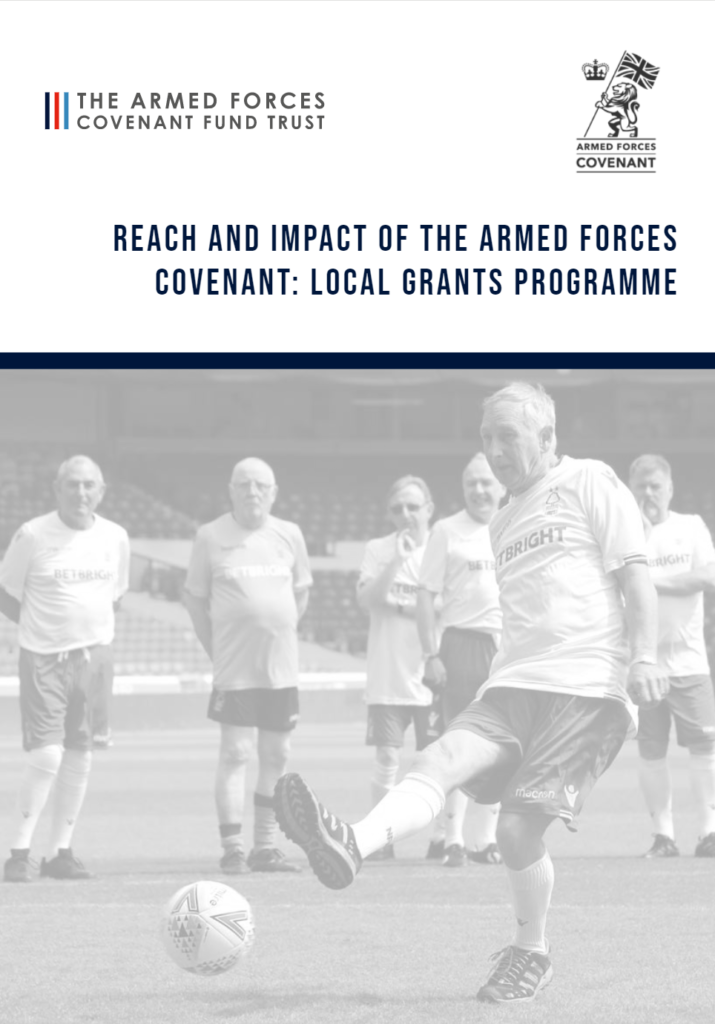
This evaluation explores the reach and impact of the Armed Forces Covenant Local Grants programme. The programme awarded grants of up to £20,000 which supported the aim of community Integration and/ or the local delivery of services. The programme ran for five years from 2015 – 2020 and delivered 712 grants worth £11,525,200.
There was wide distribution of grants throughout the UK, with projects funded in all four UK nations, and within different geographic areas within England. Two reports are available, the full report and a summary that explores 12 case studies of projects supported through the programme.
Former Serving Personnel in the Criminal Justice System Programme Evaluation
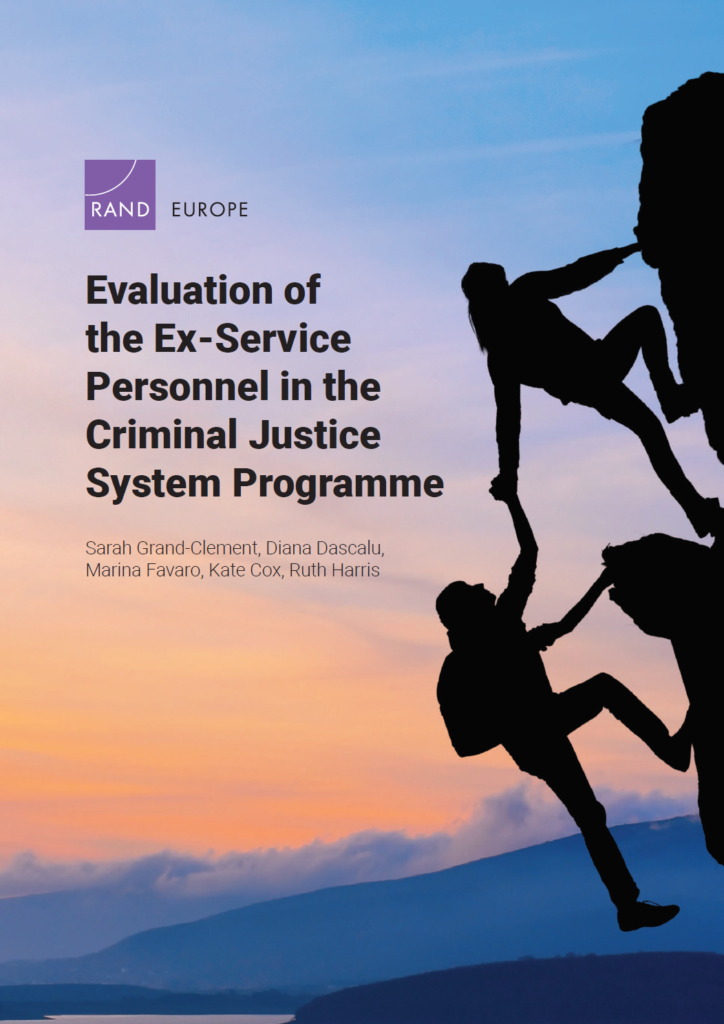
This evaluation focuses on the Armed Forces Covenant Fund Trust’s Ex-Service Personnel in the Criminal Justice System (CJS) Programme, and was evaluated by RAND Europe. Through this Programme, the Trust awarded £4.6 million in 2015 to 14 projects that support ex-Service personnel who have come into contact with the CJS, followed by a further £1.1 million of continuation grants in 2018 to seven of the 14 projects.
The aim of the Programme was to reduce reoffending and provide support to ex-Service personnel who have come into contact with the CJS. The projects and services funded under the Programme were dedicated to helping identify and support ex-Service personnel throughout the various stages of the CJS, including custody, pre-sentencing, the point of sentence and post-release from custody. This includes specialised projects to prevent reoffending, address substance abuse and mental health issues, and enable employment opportunities. The evaluation is guided by 11 evaluation questions.
Aged Veterans’ Fund Evaluation
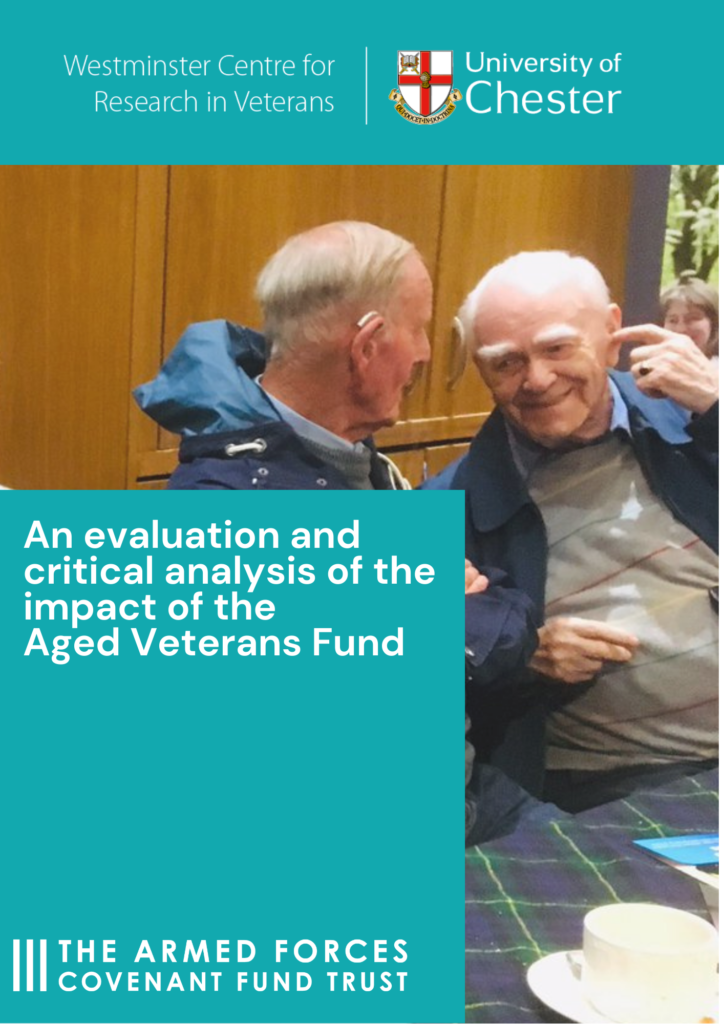
The Aged Veterans’ Fund (AVF) awarded £30 million over a five-year period to fund 19 significant grants to portfolios of projects which supported the non-core health, wellbeing and social care needs for older veterans (those born before the 1 of January 1950). The Trust worked with the University of Chester’s Westminster Centre for Research in Veterans to explore the impact of these grants, and has published an evaluative report based on data from individual project evaluations, which contains five key recommendations to improve future wellbeing for older veterans.
Data from the Aged Veterans’ Fund shows that projects have been reaching veterans between the ages of 75-80 and that there have been improvements to their health and wellbeing. There is some evidence to suggest that some of the work undertaken by projects may be particularly effective in the health outcomes that they were able to achieve.
Aged Veterans’ Fund portfolios have conducted external evaluations on the impact of their work
Accessibility of third party material
Joining Forces Aged Veterans Fund Portfolio Evaluation report
The Joining Forces Portfolio was designed to increase the wellbeing and quality of life of older veterans in England. The portfolio, run in partnership between Age UK and SSAFA, The Armed Forces charity, began in 2017 and ran for three years until June 2020. Joining Forces has made a significant positive difference to the lives of older veterans’ lives, reaching over 100,000 people. This evaluation was conducted by the University of Bath.
Download 1.0 MBMore project reports will be added when available.
Armistice and Armed Forces Communities programme evaluative report
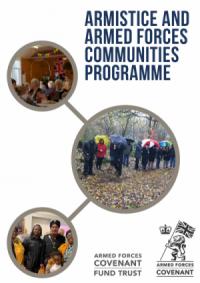
This programme aimed to help foster good relationships between Armed Forces and Civilian communities and made 2,773 awards across the country. This was the first programme that we delivered in full at the Armed Forces Covenant Fund Trust.
Armed Forces Covenant Fund: Local Grants programme evaluative report of the first three years
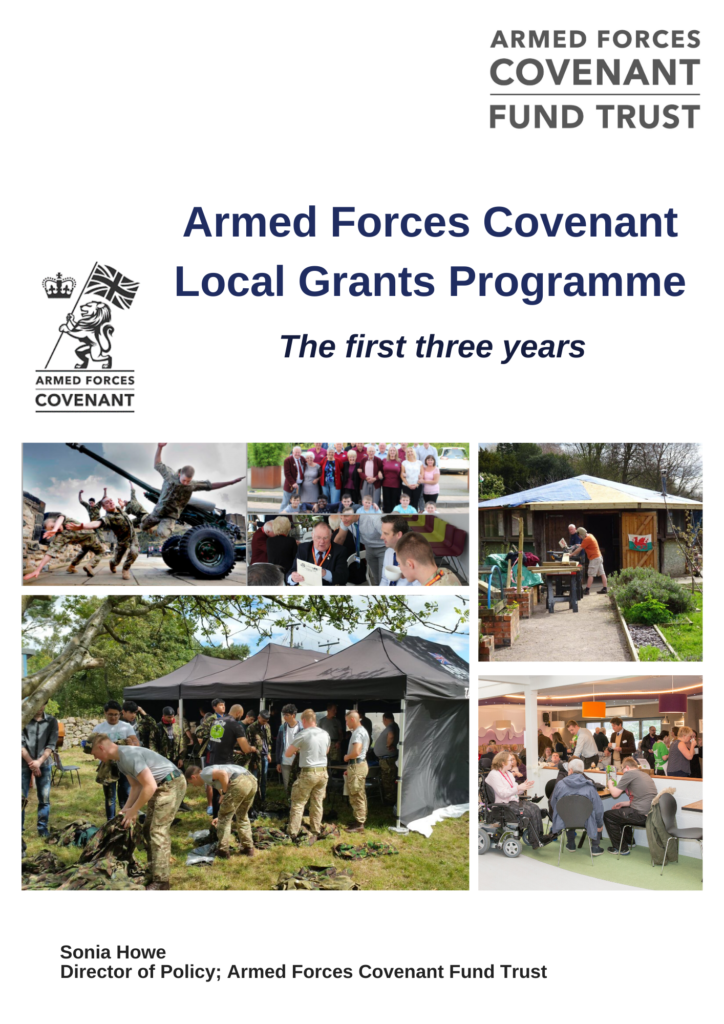
In the first three years of the Armed Forces Covenant Fund: Local Grants programme, the Trust award 430 grants worth £7 million to Armed Forces community projects.
Project evaluations
In understanding the true impact of the funding programmes we deliver, the Trust encourages organisations to conduct their own project evaluations where relevant.
We are pleased to be able to share a selection of these reports to offer an insight into the work undertaken by the organisations we support and the positive work they have achieved.
Accessibility of third party material
Mind – In It Together
The Mind In It Together project received a grant of £215,335.00 as part of the Families in Stress Programme. Mind worked with 7 Armed Forces bases across the UK with trained facilitators delivering a four-week mental health intervention programme for military spouses, building resilience via practical skills and strategies to help with difficult emotions and stressful situations. The evaluation explores the delivery of the project including interviews with facilitators and partners of serving personnel that give a snapshot of life on a military base, and the toll that deployment can bring. The evaluation showed that 79% of participants showed an improvement in mental wellbeing, and that 71% reported an improvement in their own self-esteem. The evaluation looks at the key findings of the programme, how the programme was delivered, and identified opportunities for further improvement.
Download 544.6 KBThe Warrior programme
The Warrior Programme received a £299,735.00 grant through the Trust’s Families in Stress programme in 2018. The Families in Stress Army (FiS-A) project was designed to provide rapid support to military families, and offer them a safe environment in which they could learn techniques to provide resilience and confidence, with follow up support. 91 military spouses/partner were able to access the course from 2017 – 2019. This independent evaluation of the project showed that the participants showed marked improvement in self-confidence, and improved relationships and family life. The programme also reached 120 children, who benefitted from the positive changes demonstrated by their parents as a result of the programme. Feedback also shows that serving personnel were also able to be more effective in their roles as a result of these improved relationships at home, and were able to be less distracted as a result.
Download 849.1 KBCruse Bereavement Care
Cruse Bereavement Care received £298,393.00 in 2017 as part of the Trust’s Families in Stress Programme. The project delivered a programme of bereavement training courses to military personnel based across the UK. Data from the project was analysed by the University of Sheffield The evaluation data showed that over 80% found that learning about models of bereavement was relevant, and 80% found the content on self-care and resilience relevant. The evaluation concludes that positive feedback given about the workshop indicates it is having a positive impact on people and it would be beneficial to continue delivering the workshop to military personnel.
Download 1.4 MBSheffield Mind
Sheffield Mind received £281,604 for their ‘Keeping Families in Mind’ project, working with families in Sheffield, offering one-to-one counselling, group anger management, mental health and wellbeing activities and a volunteer skills building programme. They planned to work closely with Armed Forces Welfare Officers, and to offer a bespoke programme of interventions, tailored to build resilience and discourage dependency. This evaluation aimed to discover whether or not the service has been beneficial for families of serving and veteran personnel. The evaluation was conducted to inform decisions about whether the KFIM service should be continued.
Download 1.7 MB